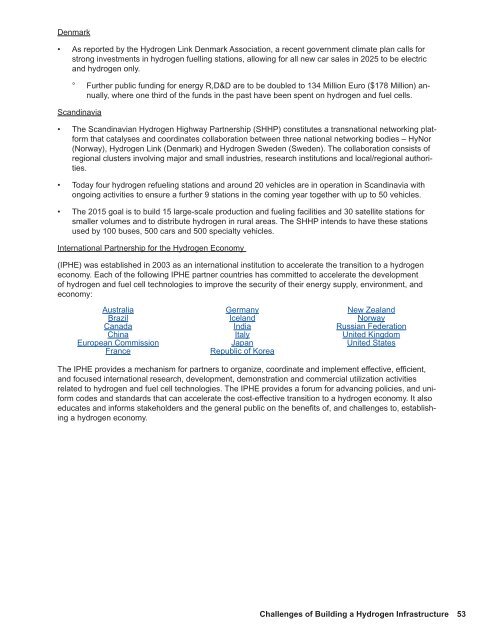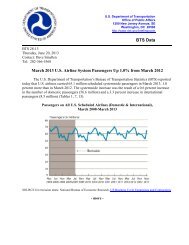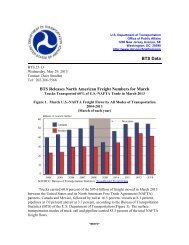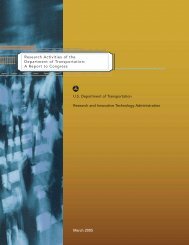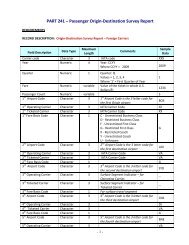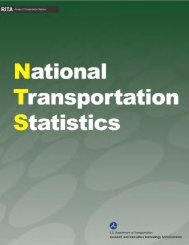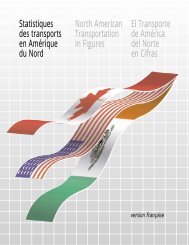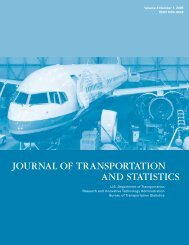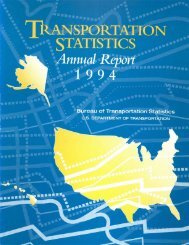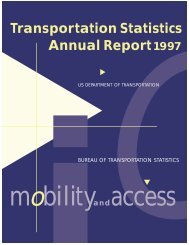Challenges - Research and Innovative Technology Administration ...
Challenges - Research and Innovative Technology Administration ...
Challenges - Research and Innovative Technology Administration ...
You also want an ePaper? Increase the reach of your titles
YUMPU automatically turns print PDFs into web optimized ePapers that Google loves.
Denmark<br />
• As reported by the Hydrogen Link Denmark Association, a recent government climate plan calls for<br />
strong investments in hydrogen fuelling stations, allowing for all new car sales in 2025 to be electric<br />
<strong>and</strong> hydrogen only.<br />
°°<br />
Further public funding for energy R,D&D are to be doubled to 134 Million Euro ($178 Million) annually,<br />
where one third of the funds in the past have been spent on hydrogen <strong>and</strong> fuel cells.<br />
Sc<strong>and</strong>inavia<br />
• The Sc<strong>and</strong>inavian Hydrogen Highway Partnership (SHHP) constitutes a transnational networking platform<br />
that catalyses <strong>and</strong> coordinates collaboration between three national networking bodies – HyNor<br />
(Norway), Hydrogen Link (Denmark) <strong>and</strong> Hydrogen Sweden (Sweden). The collaboration consists of<br />
regional clusters involving major <strong>and</strong> small industries, research institutions <strong>and</strong> local/regional authorities.<br />
•<br />
Today four hydrogen refueling stations <strong>and</strong> around 20 vehicles are in operation in Sc<strong>and</strong>inavia with<br />
ongoing activities to ensure a further 9 stations in the coming year together with up to 50 vehicles.<br />
• The 2015 goal is to build 15 large-scale production <strong>and</strong> fueling facilities <strong>and</strong> 30 satellite stations for<br />
smaller volumes <strong>and</strong> to distribute hydrogen in rural areas. The SHHP intends to have these stations<br />
used by 100 buses, 500 cars <strong>and</strong> 500 specialty vehicles.<br />
International Partnership for the Hydrogen Economy<br />
(IPHE) was established in 2003 as an international institution to accelerate the transition to a hydrogen<br />
economy. Each of the following IPHE partner countries has committed to accelerate the development<br />
of hydrogen <strong>and</strong> fuel cell technologies to improve the security of their energy supply, environment, <strong>and</strong><br />
economy:<br />
Australia<br />
Brazil<br />
Canada<br />
China<br />
European Commission<br />
France<br />
Germany<br />
Icel<strong>and</strong><br />
India<br />
Italy<br />
Japan<br />
Republic of Korea<br />
New Zeal<strong>and</strong><br />
Norway<br />
Russian Federation<br />
United Kingdom<br />
United States<br />
The IPHE provides a mechanism for partners to organize, coordinate <strong>and</strong> implement effective, efficient,<br />
<strong>and</strong> focused international research, development, demonstration <strong>and</strong> commercial utilization activities<br />
related to hydrogen <strong>and</strong> fuel cell technologies. The IPHE provides a forum for advancing policies, <strong>and</strong> uniform<br />
codes <strong>and</strong> st<strong>and</strong>ards that can accelerate the cost-effective transition to a hydrogen economy. It also<br />
educates <strong>and</strong> informs stakeholders <strong>and</strong> the general public on the benefits of, <strong>and</strong> challenges to, establishing<br />
a hydrogen economy.<br />
<strong>Challenges</strong> of Building a Hydrogen Infrastructure 53


